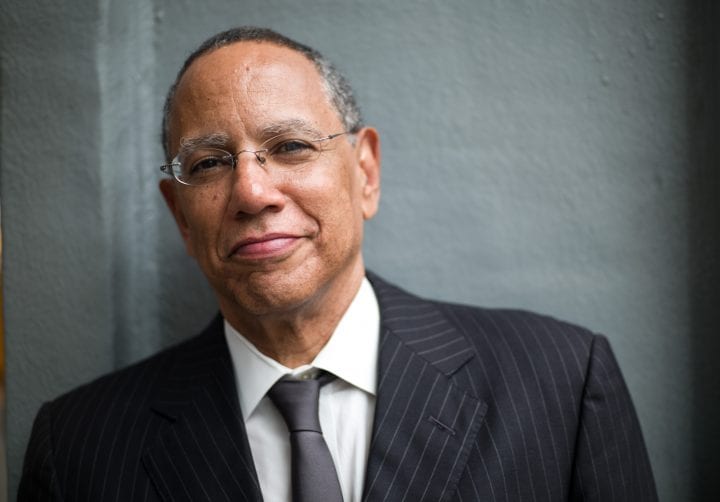Dean Baquet, the executive editor of the New York Times, will be in conversation with award-winning former Los Angeles Times media reporter Jim Rainey and hometown hero Timothy Egan about the importance of investigative journalism and the path forward for media in this political era.
Please note: We are so sorry to let you know that Marty Baron, who was originally scheduled to appear alongside Dean Baquet, has had to cancel his appearance due to health reasons. Dean and Timothy are very excited, however, to announce that journalist Jim Rainey will instead be making an appearance.
If you are a ticket holder and would like a refund, please contact boxoffice@lectures.org or call 206-621-2230 x10.
Dean Baquet is executive editor of the New York Times, a position he assumed in May 2014. He serves in the highest ranked position in the Times’s newsroom and oversees the New York Times news report in all its various forms.
Before being named executive editor, Baquet was managing editor of the Times. He previously served as Washington bureau chief for the paper from March 2007 to September 2011. Baquet rejoined the Times after several years at the Los Angeles Times, where he was editor of the newspaper since 2005, after serving as managing editor since 2000.
Previously, Baquet had been National editor of the New York Times since July 1995, after having served as deputy Metro editor since May 1995. Baquet joined the Times in April 1990 as a Metro reporter. In May 1992, he became special projects editor for the business desk, and in January 1994, he held the same title, but operated out of the executive editor’s office.
Before joining the Times, Baquet reported for the Chicago Tribune from December 1984 to March 1990, and before that, for the Times-Picayune in New Orleans for nearly seven years. While at the Chicago Tribune, Baquet served as associate Metro editor for investigations and was chief investigative reporter, covering corruption in politics and the garbage-hauling industry.
He was awarded a Pulitzer Prize for Investigative Reporting in March 1988 when he led a team of three in documenting corruption in the Chicago City Council, and was a finalist for a Pulitzer Prize in 1994 in the investigative reporting category. Baquet has also received numerous local and regional awards.
Jim Rainey has been a professional journalist for more than three decades, covering government, politics, media, the environment, and a host of other issues.
After spending most of his career at the Los Angeles Times, he came to NBCNews.com, the digital outlet of NBC, in March of 2017. His main focus has been climate change and the environment.
Jim won past awards for his stories about emotionally disturbed teens, Shoshone Indian land claims, the abuse of prisoners at California Youth Authority prisons and for “On the Media,” the twice-weekly column he wrote at the Los Angeles Times. He was part of Los Angeles Times teams that won three Pulitzer Prizes for breaking news—for coverage of the Los Angeles riots, Southern California wildfires and the 1997 North Hollywood bank robbery shootout.
Jim spent most of his career at the Times, where he covered parts of five presidential campaigns and helped launch the Politics Now blog in 2012. He spent a month in Iraq in 2006, following the media, the U.S. military and the formation of Iraq’s first substantial “post-war” government.
Along the way, he covered five mayors of Los Angeles, a handful of governors, multiple disasters, a cult mass suicide, the O.J. Simpson murder case and much more. He served as Urban Affairs Editor and State Editor for the Los Angeles Times and was appointed media writer by then Los Angeles Times Managing Editor Dean Baquet.
His journalism career began at UC Berkeley, where he was Sports Editor of the Daily Californian and witnessed the greatest moment in college football history, “The Play.” He is a frequent guest on radio and television, speaking about the media, politics and other issues.
Timothy Egan is the author of seven books. His nonfiction account of the Dust Bowl, The Worst Hard Time (2006), won the 2006 National Book Award, and he was featured prominently in the 2012 Ken Burns film on the Dust Bowl.
A lifelong journalist, Egan now writes an online opinion column for the New York Times. Prior to that, he worked as a national correspondent for the Times, roaming the West. As a Times correspondent, he shared a Pulitzer Prize in 2001 with a team of reporters for its series, “How Race is Lived in America.”
A graduate of the University of Washington, Egan also holds honorary doctorates from Whitman College, Willamette University, Lewis and Clark College, and Western Washington University. A third-generation Westerner and father of two, Mr. Egan lives in Seattle, which honored him once with the Keys to the City.


